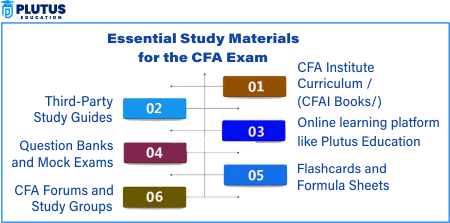The CFA course syllabus has topics from the theoretical fields of the economy and finance. Chartered Financial Analyst (CFA) is an elite certification within the finance and investment industries that is well-known for its intensive curriculum. The program equips candidates with complete knowledge to lead them to expert status in portfolio management and investment analysis. The CFA program is organized into three levels: Level 1 addresses basic concepts and tools, Level 2 addresses asset valuation and financial reporting, and Level 3 addresses portfolio management and wealth planning. Obtaining the CFA charter increases career prospects and professional reputation, as charterholders are able to address sophisticated financial issues in a global economy.
CFA Course Syllabus
Candidates are directed through the basic principles of investment analysis and portfolio management in the structure of the CFA course. It has three levels to progressively develop your knowledge and skills. The syllabus includes extensive topics ranging from ethics to financial reporting as well as asset valuation. These categories have a purpose and play a useful role in introducing candidates to the nuances in the finance world and providing an insight into deeper dynamics of the industry.
CFA Level 1 Syllabus
CFA Level 1 syllabus concept that depends on the investment and financial analysis. Ethics, quantitative methods, economics, financial reporting and analysis, corporate finance, equity investments, and fixed income are some of the major subjects under this. The candidates will gain the fundamental finance principles and tools, such as asset valuation techniques. This has majorly emphasized the understanding of financial statements and the functioning of markets and institutions. Knowledge of the candidates would be tested using the exam, focusing on recalling the knowledge and understanding the basics.
| Topic | Exam weight |
|---|---|
| Ethical and Professional Standards | 15-20% |
| Quantitative Methods | 6-9% |
| Economics | 6-9% |
| Financial Statement Analysis | 11-14% |
| Corporate Issuers | 6-9% |
| Equity Investments | 11-14% |
| Fixed Income | 11-14% |
| Derivatives | 5–8% |
| Alternative Investments | 7-10% |
| Portfolio Management | 8-12% |
CFA Level 2 Syllabus
CFA Level 2 further entails the valuation of assets while applying intense knowledge to real-world analyses. Topics covered are advanced, including equity and fixed income analysis, derivatives, alternative investments, and portfolio management. Other studies include quantitative methods and financial reporting in more complex contexts. It is more focused on the interpretation and analysis of data regarding financial variables and a decision to invest or not. Testing for the exam takes the format of item sets, testing the degree of analytical ability and application of concepts.
| Topic | Exam weight |
|---|---|
| Ethical and Professional Standards | 10–15% |
| Quantitative Methods | 5-10% |
| Economics | 5-10% |
| Financial Statement Analysis | 10-15% |
| Corporate Issuers | 5-10% |
| Equity Investments | 10-15% |
| Fixed Income | 10-15% |
| Derivatives | 5-10% |
| Alternative Investments | 5-10% |
| Portfolio Management and Wealth Planning | 10-15% |
CFA Level 3 Syllabus
CFA Level 3 focuses on portfolio management and wealth planning, with utmost emphasis on the application of investment principles. This syllabus includes such topics as behavioral finance, risk management, and the ethical considerations in portfolio management. Candidates are required to construct and manage investment portfolios with attention to the particular needs and goals of individual clients. A criterion for the exam is given through the use of perceived essay questions with dummy data and other sets (composed of items), meaning a good skill to analyze is needed, as well as transferring information through writing. The approach could be primarily developed on the basis of integrating the different disciplines of finance into holistic investment strategies.
| Topic | Exam weight |
|---|---|
| Asset Allocation | 15–20% |
| Portfolio Construction | 15–20% |
| Performance Measurement | 5–10% |
| Derivatives and Risk Management | 10–15% |
| Ethical and Professional Standards | 10–15% |
| Pathways (Portfolio Management or Private Markets or Private Wealth) | 30–35% |
CFA Exam Day Preparation
The day of the CFA exam requires preparing in advance by understanding the format and contents of the exam, taking with you the necessary items, and lastly refreshing yourself on essential materials to get the result that you desire. How you can best prepare for the test is what this is about:
What to Expect on Exam Day
- Be punctual, please. This will leave you time for the registration process and the trip to your preset chair.
- The two-part test will consist of two sessions, which will be separated by a break. And it is a standard practice with a group of questions, for example, one with the multiple choices and the next with the item sets or constructed response (essay) questions.
- Alongside other things, the following safety measures will be strictly enforced: the forbidden use of electronic devices and the requirement of leaving personal items at the desk.

Essential Items to Bring
- Your CFA Institute admission ticket and a valid government-issued ID.
- Approved calculators (make sure to bring extra batteries or a backup calculator).
- Pens, pencils, and erasers.
- A watch (without an alarm) to keep track of time since electronic devices are not allowed.
Last-Minute Review Strategies
- Prioritize the coverage of high-yield subjects and trainees on mechanisms that have been over-randomly chosen.
- The student should work on being able to solve problems quickly with the highest efficiency.
- Don’t try to understand the new material just to pass the exam, but only re-read the instructions that you already understood.
CFA Syllabus FAQs
Q1. What is CFA Course Syllabus?
The CFA course syllabus is divided into three levels, covering a wide range of topics essential for finance professionals. The course is consists of ethics, quantitative methods, financial report, equity analysis, fixed income, derivatives, alternative investments, and portfolio management.
Q2. Is CFA harder than CA?
The difficulty of CFA compared to CA (Chartered Accountant) largely depends on individual strengths and career goals. CFA is all about investment analysis and portfolio management, whereas CA is all about accounting, taxation, and auditing, and that is what makes each of them a unique, yet difficult, one.
Q3. Is CFA easy for Indians?
The CFA exam is generally considered challenging due to its extensive syllabus and the depth of understanding required in various financial concepts. Many students need about 300 hours a semester to get to the second level, with some needing more or less depending on their abilities.
Q4. Is CFA exam easy or difficult?
Whether the CFA is tough or easy varies from person to person, depending on their background and experience in finance. While some candidates find the material manageable, others may struggle with its complexity and the rigorous examination format.
Q5. Are there any prerequisites for CFA syllabus?
Ans. While there are no formal prerequisites to start the CFA program, candidates are recommended to have a basic understanding of finance and investment concepts. It is also beneficial to have a bachelor’s degree or be in the final year of undergraduate studies, although work experience in finance can also be advantageous.


